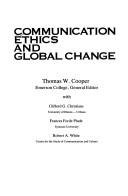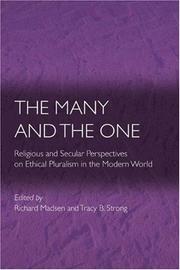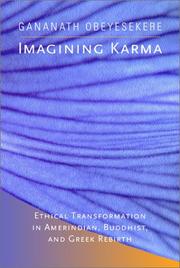| Listing 1 - 10 of 11 | << page >> |
Sort by
|
Book
ISBN: 0674981693 0674981685 Year: 2018 Publisher: Cambridge, MA : Harvard University Press,
Abstract | Keywords | Export | Availability | Bookmark
 Loading...
Loading...Choose an application
- Reference Manager
- EndNote
- RefWorks (Direct export to RefWorks)
This is a study of what ethical principles and practices people around the world hold in common and what institutions best allow virtue to flourish. It is based on a Carnegie Council project on comparative ethics that Michael Ignatieff has run for the past three years. Most works of comparative ethics look at formal systems of belief. What, for example, do Christian and Confucian texts say about the role of the family? What do the Koran or John Rawls say about treatment of the poor? This is, by contrast, a work of "lived ethics." Ignatieff took a team of researchers around the world to examine what values and ethical beliefs guide diverse people in practice. They went to places where people are living under unusual stresses or where contemporary social challenges are particularly clear. They went to Brazil, for example, to discuss life where corruption is a serious problem, to Sarajevo to talk about reconciliation, to Queens in New York to talk about diversity, and to Fukushima, Japan, to talk about disaster and recovery. Overall, they found more commonality than they were expecting, that whatever formal systems of belief prevail, people tend to orient themselves in similar ways around the values of trust, tolerance, forgiveness, reconciliation, and resilience. But where people are suffering they often doubt that others share their ethical beliefs and begin to circle the wagons to defend their own group. We shouldn't expect citizens to be heroes. So what institutions and political arrangements encourage or inhibit virtue? Overall, Ignatieff says, liberal constitutionalism seems most effective, but only as long as poverty and inequality are not allowed to get out of hand.--
Applied ethics --- Ethics --- Virtues --- Ethics, Comparative. --- Social aspects --- Political aspects

ISBN: 0801302242 9780801302244 Year: 1989 Publisher: New York Longman
Abstract | Keywords | Export | Availability | Bookmark
 Loading...
Loading...Choose an application
- Reference Manager
- EndNote
- RefWorks (Direct export to RefWorks)
journalistieke deontologie --- Social ethics --- massamedia --- ethiek --- Mass communications --- Communication --- Ethics, Comparative --- Moral and ethical aspects --- -Ethics, Comparative --- Comparative ethics --- Philosophy, Comparative --- Communication, Primitive --- Mass communication --- Sociology --- Communication - Moral and ethical aspects

ISBN: 0691099936 0691099928 9786612158452 1282158457 1400825598 9781400825592 9780691099927 9780691099934 Year: 2009 Volume: *1 Publisher: Princeton, NJ
Abstract | Keywords | Export | Availability | Bookmark
 Loading...
Loading...Choose an application
- Reference Manager
- EndNote
- RefWorks (Direct export to RefWorks)
The war on terrorism, say America's leaders, is a war of Good versus Evil. But in the minds of the perpetrators, the September 11 attacks on New York and Washington were presumably justified as ethically good acts against American evil. Is such polarization leading to a violent "clash of civilizations" or can differences between ethical systems be reconciled through rational dialogue? This book provides an extraordinary resource for thinking clearly about the diverse ways in which humans see good and evil. In nine essays and responses, leading thinkers ask how ethical pluralism can be understood by classical liberalism, liberal-egalitarianism, critical theory, feminism, natural law, Confucianism, Islam, Judaism, and Christianity. Each essay addresses five questions: Is the ideal society ethically uniform or diverse? Should the state protect, ban, or otherwise intervene in ethically based differences? How should disagreements on the rights and duties of citizens be dealt with? Should the state regulate life-and-death decisions such as euthanasia? To what extent should conflicting views on sexual relationships be accommodated? This book shows that contentious questions can be discussed with both incisiveness and civility. The editors provide the introduction and Donald Moon, the conclusion. The contributors are Brian Barry, Joseph Boyle, Simone Chambers, Joseph Chan, Christine Di Stefano, Dale F. Eickelman, Menachem Fisch, William Galston, John Haldane, Chandran Kukathas, David Little, Muhammad Khalid Masud, Carole Pateman, William F. Scheuerman, Adam B. Seligman, James W. Skillen, James Tully, and Lee H. Yearley.
Comparative ethics --- Ethics [Comparative ] --- Ethique comparée --- Pluralism (Social sciences) --- Pluralisme (Sciences sociales) --- Pluralisme (Sociale wetenschappen) --- Vergelijkende ethiek --- Ethical relativism. --- Ethics, Comparative. --- Religious ethics. --- 261 --- Ethics, Comparative --- Verschillende betrekkingen van de Kerk; de Kerk in een pluralistische maatschappij --- Cultural diversity --- Diversity, Cultural --- Diversity, Religious --- Ethnic diversity --- Pluralism, Cultural --- Religious diversity --- Culture --- Cultural fusion --- Ethnicity --- Multiculturalism --- Philosophy, Comparative --- Religions --- Moral relativism --- Relativism, Ethical --- Relativity (Ethics) --- Ethics --- Ethics, Evolutionary --- Ethical relativism --- Religious ethics
Book
ISBN: 940120537X 1435615476 9781435615472 9042023376 9789042023376 9789042023376 9042023376 9789401205375 Year: 2008 Publisher: Amsterdam New York, NY Rodopi
Abstract | Keywords | Export | Availability | Bookmark
 Loading...
Loading...Choose an application
- Reference Manager
- EndNote
- RefWorks (Direct export to RefWorks)
The various Christian, Muslim, traditional (African), and secular (Western) ways of imagining and coping with evil collected in this volume have several things in common. The most crucial perhaps and certainly the most striking aspect is the problem of defining the nature or characteristics of evil as such. Some argue that evil has an essence that remains constant, whereas others say its interpretation depends on time and place. However much religious and secular interpretations of evil may have changed, the human search for sense and meaning never ends. Questions of whom to blame and whom to address—God, the devil, fate, bad luck, or humans—remain at the center of our explanations and our strategies to comprehend, define, counter, or process the evil we do and the evil done to us by people, God, nature, or accident. Using approaches from cultural anthropology, religious studies, theology, philosophy, psychology, and history, the contributors to this volume analyze how several religious and secular traditions imagine and cope with evil.
Good and evil --- Evil --- Wickedness --- Ethics --- Philosophy --- Polarity --- Religious thought --- Religious aspects --- Religious aspects. --- 216 --- Goed en kwaad --- Ethics, Comparative --- Comparative ethics --- Philosophy, Comparative
Book
ISBN: 1283400200 9786613400208 3110252899 3112191684 3110252872 9783110252897 9783110252873 9781283400206 9783110252873 Year: 2011 Publisher: Berlin Boston
Abstract | Keywords | Export | Availability | Bookmark
 Loading...
Loading...Choose an application
- Reference Manager
- EndNote
- RefWorks (Direct export to RefWorks)
Chinese and Greco-Roman ethics present highly articulate views on how one should live; both of these traditions remain influential in modern philosophy. The question arises how these traditions can be compared with one another. Comparative ethics is a relatively young discipline, and this volume is a major contribution to the field. Fundamental questions about the nature of comparing ethics are treated in two introductory chapters, followed by chapters on core issues in each of the traditions : harmony, virtue, friendship, knowledge, the relation of ethics to morality, relativism. The volume closes with a number of comparative studies on emotions, being and unity, simplicity and complexity, and prediction.
Ethics - China. --- Ethics -- China. --- Ethics - Greece. --- Ethics -- Greece. --- Ethics - Rome. --- Ethics -- Rome. --- Ethics, Ancient. --- Ethics, Comparative. --- Ethics, Comparative --- Ethics, Ancient --- Ethics --- Philosophy --- Philosophy & Religion --- Ethics, Chinese --- Ancient ethics --- Comparative ethics --- Deontology --- Ethics, Primitive --- Ethology --- Moral philosophy --- Morality --- Morals --- Philosophy, Moral --- Science, Moral --- Ethics, Greek --- Philosophy, Comparative --- Values
Book
ISBN: 058506458X 9780585064581 1438417365 Year: 1991 Publisher: Albany : State University of New York Press,
Abstract | Keywords | Export | Availability | Bookmark
 Loading...
Loading...Choose an application
- Reference Manager
- EndNote
- RefWorks (Direct export to RefWorks)
Excellence. --- Virtue. --- Environmental ethics. --- Ethics, Modern. --- Ethics, Comparative. --- Ethics --- Excellence --- Virtue --- Environmental ethics --- Ethics, Modern --- Ethics, Comparative --- Philosophy --- Philosophy & Religion --- Comparative ethics --- Philosophy, Comparative --- Modern ethics --- Deontology --- Ethics, Primitive --- Ethology --- Moral philosophy --- Morality --- Morals --- Philosophy, Moral --- Science, Moral --- Values --- Environmental quality --- Human ecology --- Conduct of life --- Human acts --- Excellency --- Virtues --- Perfection --- Ethics, Greek --- Moral and ethical aspects --- Ethics.
Book
ISBN: 1628922273 1501304739 1628922281 9781628922288 9781628922271 9781628922257 9781501304736 1628922257 9781628922257 9781628922264 1628922265 Year: 2016 Publisher: New York : Bloomsbury Academic,
Abstract | Keywords | Export | Availability | Bookmark
 Loading...
Loading...Choose an application
- Reference Manager
- EndNote
- RefWorks (Direct export to RefWorks)
"Rebirth and the Stream of Life explores the diversity as well as the ethical and religious significance of rebirth beliefs, focusing especially on Hindu and Buddhist traditions but also discussing indigenous religions and ancient Greek thought. Utilizing resources from religious studies, anthropology and theology, an expanded conception of philosophy of religion is exemplified, which takes seriously lived experience rather than treating religious beliefs in isolation from their place in believers' lives. Drawing upon his expertise in interdisciplinary working and Wittgenstein-influenced approaches, Mikel Burley examines several interrelated phenomena, including purported past-life memories, the relationship between metaphysics and ethics, efforts to 'demythologize' rebirth, and moral critiques of the doctrine of karma. This range of topics, with rebirth as a unifying theme, makes the book of value to anyone interested in philosophy, the study of religions, and what it means to believe that we undergo multiple lives."--Bloomsbury Publishing.
Reincarnation --- Karma. --- Ethics, Comparative. --- Philosophy, Indic. --- Indic philosophy --- Philosophy, East Indian --- Hindu philosophy --- Comparative ethics --- Philosophy, Comparative --- Parapsychology --- Religion --- Past-lives regression --- Rebirth --- Regression, Past-lives --- Pre-existence --- Soul --- Theosophy --- Transmigration --- Reincarnation - Comparative studies.
Book
ISBN: 0585063990 9780585063997 1438424590 9781438424590 Year: 1990 Publisher: Albany, N.Y. State University of New York Press
Abstract | Keywords | Export | Availability | Bookmark
 Loading...
Loading...Choose an application
- Reference Manager
- EndNote
- RefWorks (Direct export to RefWorks)
Virtue. --- Virtues. --- Courage. --- Ethics, Comparative. --- Virtue --- Virtues --- Courage --- Ethics, Comparative --- Ethics --- Philosophy --- Philosophy & Religion --- Comparative ethics --- Philosophy, Comparative --- Bravery --- Courageousness --- Dauntlessness --- Fearlessness --- Heroism --- Intrepidity --- Intrepidness --- Valiance --- Valiancy --- Valiantness --- Valor --- Valorousness --- Conduct of life --- Heroes --- Human acts --- Mencius --- Thomas, --- Akʻvineli, Tʻoma, --- Akvinietis, Tomas, --- Akvinskiĭ, Foma, --- Aquinas, --- Aquinas, Thomas, --- Foma, --- Thomas Aquinas, --- Tʻoma, --- Toma, --- Tomas, --- Tomasu, --- Tomasu, Akwinasu, --- Tomasz, --- Tommaso, --- Tʻovma, --- Тома, Аквінський, --- תומאס, --- תומס, --- اكويني ، توما --- Ethics. --- Ākvīnās, Tūmās, --- اكويني، توما, --- آکويناس، توماس,

ISBN: 0520936302 1597346691 9780520936300 0585466432 9780585466439 9781597346696 9780520232204 0520232208 9780520232433 0520232437 Year: 2002 Publisher: Berkeley University of California Press
Abstract | Keywords | Export | Availability | Bookmark
 Loading...
Loading...Choose an application
- Reference Manager
- EndNote
- RefWorks (Direct export to RefWorks)
With Imagining Karma, Gananath Obeyesekere embarks on the very first comparison of rebirth concepts across a wide range of cultures. Exploring in rich detail the beliefs of small-scale societies of West Africa, Melanesia, traditional Siberia, Canada, and the northwest coast of North America, Obeyesekere compares their ideas with those of the ancient and modern Indic civilizations and with the Greek rebirth theories of Pythagoras, Empedocles, Pindar, and Plato. His groundbreaking and authoritative discussion decenters the popular notion that India was the origin and locus of ideas of rebirth. As Obeyesekere compares responses to the most fundamental questions of human existence, he challenges readers to reexamine accepted ideas about death, cosmology, morality, and eschatology. Obeyesekere's comprehensive inquiry shows that diverse societies have come through independent invention or borrowing to believe in reincarnation as an integral part of their larger cosmological systems. The author brings together into a coherent methodological framework the thought of such diverse thinkers as Weber, Wittgenstein, and Nietzsche. In a contemporary intellectual context that celebrates difference and cultural relativism, this book makes a case for disciplined comparison, a humane view of human nature, and a theoretical understanding of "family resemblances" and differences across great cultural divides.
Religious ethics --- Reincarnation --- Past-lives regression --- Rebirth --- Regression, Past-lives --- Pre-existence --- Soul --- Theosophy --- Transmigration --- Reincarnation (Buddhism) --- Comparative studies. --- Buddhism. --- Reincarnation-Buddhism.. --- Reincarnation-Comparative studies.. --- Religious ethics-Comparative studies. --- Reincarnation - Buddhism. --- Reincarnation - Comparative studies. --- Religious ethics - Comparative studies. --- amerindian tradition. --- buddhism. --- buddhist tradition. --- canada. --- classicists. --- cosmology. --- cross cultural scholarship. --- cultural relativism. --- cultural stories. --- death. --- empedocles. --- ethics. --- greek tradition. --- human condition. --- indic civilizations. --- indologists. --- intellectual context. --- karma. --- melanesia. --- methodological framework. --- nietzsche. --- personal transformation. --- philosophy. --- pindar. --- plato. --- pythagoras. --- rebirth. --- reincarnation. --- siberia. --- textbooks. --- weber. --- west africa. --- wittgenstein.
Book
ISBN: 0520917219 0585031797 9780520917217 9780585031798 Year: 1995 Publisher: London University of California Press
Abstract | Keywords | Export | Availability | Bookmark
 Loading...
Loading...Choose an application
- Reference Manager
- EndNote
- RefWorks (Direct export to RefWorks)
At a time when politics and virtue seem less compatible than oil and water, Democracy and Moral Development shows how to bring the two together. Philosopher David Norton applies classical concepts of virtue to the premises of modern democracy. The centerpiece of the book is a model of organizational management applicable to the state, business, the professions, and voluntary communities.
Political ethics --- Ethics, Comparative. --- Ethics --- History. --- Ethics, Greek --- Comparative ethics --- Ethics, Political --- Ethics in government --- Government ethics --- Political science --- Politics, Practical --- Moral and ethical aspects --- Philosophy, Comparative --- Civics --- business management. --- business practices. --- classical liberalism. --- community. --- democracy. --- doctrine of developmental democracy. --- ethics. --- government and governing. --- individuality. --- misdirected. --- model of organizational management. --- modern democracy. --- morality. --- political action. --- politics of virtue. --- politics reform. --- politics. --- responsibilities. --- rights. --- sociality. --- state governments. --- true individuals. --- volunteer communities.
| Listing 1 - 10 of 11 | << page >> |
Sort by
|

 Search
Search Feedback
Feedback About UniCat
About UniCat  Help
Help News
News